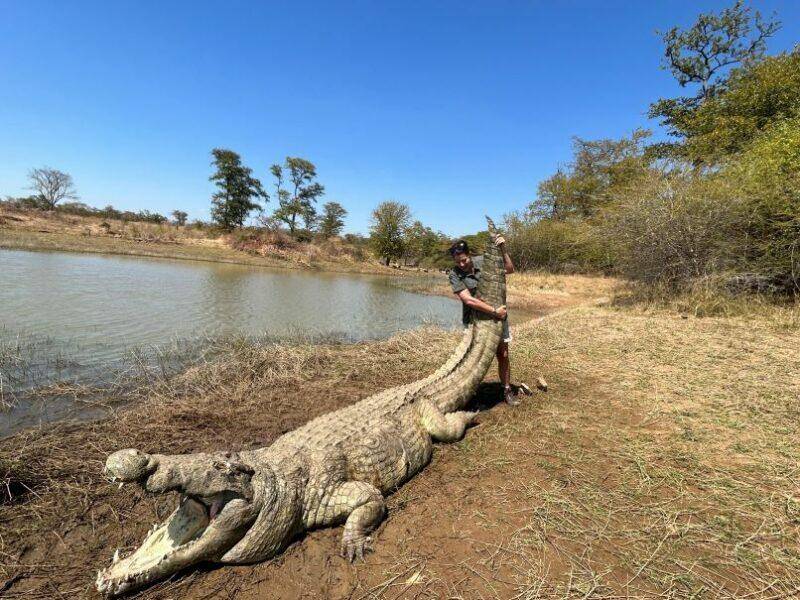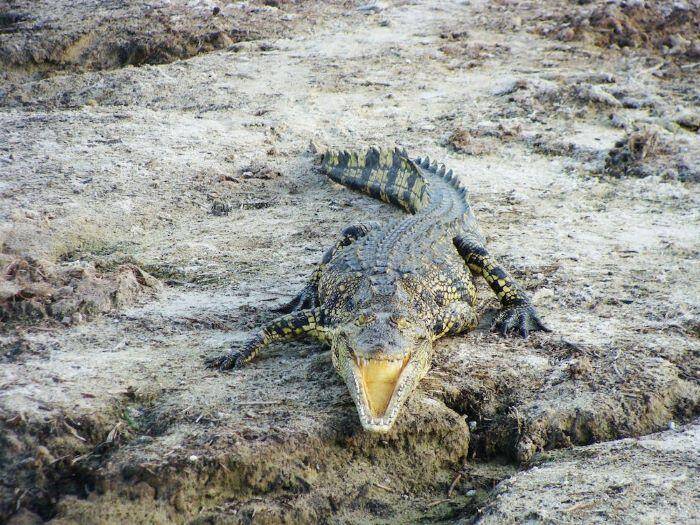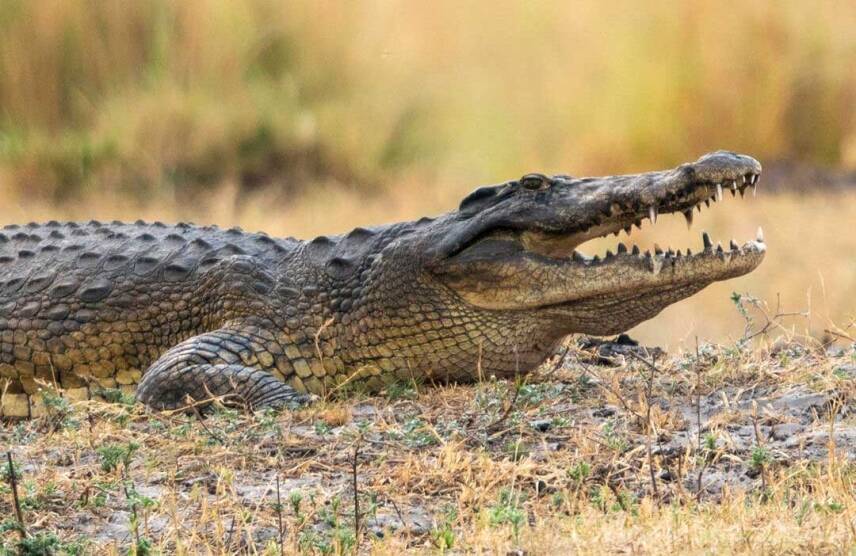Crocodile hunting in Africa offers a unique and challenging experience for game hunters. These ancient reptiles, with their powerful jaws and stealthy movements, are considered apex predators, making them a coveted trophy for many. However, the hunt isn’t straightforward; it involves navigating remote areas and employing precise techniques to outsmart these elusive creatures.
Crocodiles are often hunted from blinds because they can detect the slightest vibrations and disappear underwater in seconds. This makes traditional walk-and-stalk methods particularly challenging. For those looking to hunt a member of the Dangerous 7, the Nile crocodile is the ideal target, combining size, aggression, and an almost impenetrable hide.
Understanding the intricacies of crocodile hunting not only enhances the experience but also underscores the importance of respecting these formidable animals and their diminishing habitats.
[DYNAMIC-BLOGTABLEOFCONTENT]
Key Takeaways
- Crocodile Hunting Methods: Crocodiles, particularly the Nile crocodile, are often hunted from blinds due to their ability to detect vibrations and quickly submerge underwater. Traditional walk-and-stalk methods are less effective.
- Necessary Equipment: Hunters typically use high-caliber rifles to penetrate the thick hide of crocodiles. Essential tools include spotting scopes, binoculars, and camouflage clothing to enhance safety and effectiveness.
- Challenges and Safety: Crocodile hunting is highly challenging due to the animal’s stealth and power. Safety measures such as having field first-aid kits and clear exit strategies are crucial.
- Legal and Ethical Considerations: Compliance with local regulations and ethical hunting practices is essential. Some crocodile species are protected, and hunting them requires proper permits.
- Preparation and Guidance: Proper preparation involves studying crocodile behavior and utilizing experienced guides who are familiar with the hunting terrain and techniques.
- Historical and Modern Techniques: Understanding both historical methods and modern techniques of crocodile hunting can provide valuable insights for a successful and respectful hunt.
Overview of Crocodile Hunting
Crocodile hunting in Africa is a unique and exhilarating experience. It merges the thrill of tracking apex predators with the challenge of navigating remote, untouched areas. The Nile crocodile, a favored target on game hunting safaris, embodies the perfect blend of power and stealth.
Methods of Crocodile Hunting
Crocodiles are often hunted from blinds. These structures hide hunters, allowing them to observe the water without being detected. The Nile crocodile can sense vibrations, making it crucial to move silently. Walk-and-stalk methods are less effective since crocodiles dive underwater at the slightest hint of danger.
Hunting Gear
Hunters usually employ high-caliber rifles. These weapons must be powerful enough to penetrate the crocodile’s thick, rigid skin. Aim for precise shots to vital areas, usually the brain or spine. This ensures a humane kill while preserving the hide and skull for trophies.
Challenges in Crocodile Hunting
Hunting crocodiles isn’t for the faint-hearted. These predators possess powerful jaws and unmatched stealth. They can remain almost invisible in the water, blending seamlessly with their surroundings. On an African hunting safari, engaging with these creatures tests both skill and stamina.
Importance of Preparation
Preparation is vital for a successful hunting trip. Study the behavior of crocodiles, understand their habitat, and familiarize yourself with their movements. Utilize experienced guides who understand the terrain and specific hunting techniques required.
Essential Tips
- Always follow safety protocols.
- Stay patient; crocodile hunting can take time.
- Be prepared to travel to remote areas.
Insights from Experts
Experts recommend hunting during cooler parts of the day when crocodiles are more active. Early morning and late afternoon provide the best opportunities for sightings. Experienced guides can share invaluable tips from their years of tracking these elusive creatures.
For more information and to plan your hunt, visit Game Hunting Safaris.
Crocodile hunting on an African hunt offers both challenge and reward. With the right preparation and respect for these powerful predators, it becomes an unforgettable adventure.

Historical Methods of Crocodile Hunting
Exploring how crocodiles were hunted in the past gives us insight into the evolution of hunting techniques. Here’s a breakdown of indigenous techniques and early European approaches.
Indigenous Techniques
Indigenous communities had various traditional methods to hunt crocodiles. These techniques were often rooted in deep respect and knowledge of the animal’s behavior.
- Traps and Snares: Many tribal communities used elaborate traps and snares. For example, constructing pit traps near water sources where crocodiles were known to bask or walk.
- Spearfishing: Utilizing spears crafted from local materials, hunters approached crocodiles quietly, often in dugout canoes, and aimed for the vital areas of the crocodile’s body.
- Baiting: Placing animal carcasses near known crocodile territories was another method. Hunters would wait in hiding until the crocodile approached to feed, making it easier to trap or attack.
Early European Practices
When Europeans started hunting crocodiles, they brought different techniques and equipment that contrasted with indigenous methods.
- Firearms: Early explorers and settlers introduced firearms. Using rifles, hunters aimed from a distance, targeting the brain for an instant kill since a crocodile’s skin was tough and resistant to many weapons.
- Boat Hunts: Europeans often hunted crocodiles from boats. Navigating rivers and lakes, they would spot and shoot crocodiles basking on the banks or floating just below the water surface.
For more detailed information on modern hunting practices and guidance, visit Game Hunting Safaris.
Modern Crocodile Hunting Techniques
Modern crocodile hunting demands precision, patience, and a firm understanding of these formidable reptiles. Our tactics blend proven methods with contemporary technology, ensuring efficiency and safety during hunting trips in Africa.
Equipment Used
In crocodile hunting, the right equipment isn’t just helpful; it’s necessary. High-powered rifles such as a 7mm, 300-win mag, or .375 are recommended for their accuracy and stopping power. These rifles ensure the hunter can penetrate a crocodile’s thick skull or vertebrae, aiming for critical spots to guarantee a humane kill. Any disruption in aim could result in the crocodile escaping, making the choice of firearm crucial.
Spotting scopes, binoculars, and rangefinders are also essential. They assist in spotting crocodiles from a distance, especially since crocodiles often remain partially submerged. These tools are invaluable when hunting from blinds, as they allow hunters to keep watch without giving away their position. Laser rangefinders provide accurate distance measurements, crucial for long-range shots.
Proper attire, including camouflage clothing, helps hunters blend into their surroundings, minimizing the chances of alerting the crocodile. Long sleeves and pants protect against the harsh African environment, while sturdy boots ensure ease of movement along riverbanks and swampy areas.
Safety Measures
Safety takes priority in crocodile hunting, given the inherent risks. It’s essential to approach hunting areas cautiously and remain alert, as crocodiles can strike swiftly. When hunting near water, always have a clear exit strategy; crocodiles can surprise even the most experienced hunters.
When aiming, always ensure a clear line of sight and consider the backdrop. Misfires could pose risks to the hunting party and others in the vicinity. Wearing ear protection is critical when using high-powered rifles, as the sound can cause hearing damage.
Field first-aid kits should always be on hand. In the remote areas often visited for crocodile hunts, immediate medical assistance isn’t always available, so being prepared can make a significant difference in emergencies.
Modern crocodile hunting marries tradition with technology, demanding both respect for the animal and skillful execution. Successfully hunting these apex predators adds an unparalleled chapter to any African hunting safari. For more info on planning your next adventure, visit /.

Legal and Ethical Considerations
When we explore how crocodiles are hunted, it’s vital to consider the legal and ethical frameworks surrounding this activity. Ensuring these guidelines are adhered to maintains the ecological balance and respects wildlife protection laws.
Protected Species
Several crocodile species fall under legal protection to prevent overhunting and extinction. The Nile crocodile, for instance, is protected under the CITES (Convention on International Trade in Endangered Species of Wild Fauna and Flora) appendices. Hunting these species without proper permits is illegal and punishable by law. Ethical hunters must verify whether the targeted crocodile species is protected. Many African hunting safaris specialize in species that are legally huntable to avoid legal issues and ensure conservation efforts remain robust.
Hunting Regulations
Legal crocodile hunting involves complying with specific regulations. Various regions in Africa, such as Botswana and Zambia, have strict laws governing hunting practices. These rules dictate hunting seasons, permissible equipment, and bag limits. Following these regulations not only ensures the hunt is legal but also supports sustainable wildlife management.
Ethical considerations include using humane methods to hunt crocodiles, ensuring quick, clean kills to minimize suffering. Hunters should use equipment like high-powered rifles and follow best practices in hunting techniques. Additionally, participating in regulated hunting trips, often organized by reputable African hunting safari brokers, helps in adhering to local laws and promoting sustainable hunting practices. For more comprehensive details, visit Game Hunting Safaris.
So, you’re interested in Game Hunting Safaris? You’ve come to the right place. Game hunting in Africa is a thrilling activity that brings you closer to nature and tests your skills and instincts. Plus, it’s a great way to contribute to the conservation of African wildlife and habitats. Let’s dive into what makes game hunting safaris so special, what you need to know before embarking on your adventure, and how to make the most of your trip.
Impact on Ecosystem
Africa’s vast landscapes provide a unique backdrop for safari hunts. From the savannas of Tanzania to the dense jungles of Cameroon, each region offers its own set of challenges and rewards. African Hunting Safaris aren’t just about the hunt; they immerse you in the continent’s diverse ecosystems and wildlife.
Preparing for Your Safari
Choosing the Right Safari Broker
Finding a reputable African Hunting Safari Broker is crucial. A good broker will not only organize your trip and ensure compliance with local laws and regulations but also provide support throughout your adventure. We recommend browsing through trusted platforms like Game Hunting Safaris for options.
What to Pack
Packing right can make or break your safari. Here are the essentials:
- Clothing: Opt for lightweight, moisture-wicking fabrics. Neutral colors like beige and olive are best for blending in.
- Gear: Bring high-powered rifles, binoculars, spotting scopes, and a reliable GPS.
- First Aid: Always have a well-stocked first aid kit.
Having the right equipment ensures a smooth and successful hunt.
While on Safari
Tracking and Stalking Game
Tracking is about patience and observation. Experienced hunters often look for signs like footprints, droppings, and broken foliage. Binoculars and spotting scopes are crucial for identifying game from a distance.
Making the Shot
Aim for a clean, ethical shot. Knowledge of the animal’s anatomy is essential. Vitals like the heart and lungs are the best targets. Always be sure of your shot to avoid unnecessary suffering.
Safety First
Safety can’t be overstated. Always be aware of your surroundings, and make sure anyone in your party knows their roles and responsibilities. Never take unnecessary risks.
Post-Hunt Activities
Trophy Handling
Properly handling your trophy is crucial for preservation. It’s advisable to rely on local experts for skinning and prepping. They know the best practices to ensure your trophy remains in excellent condition.
Conservation and Giving Back
Participants in regulated hunting trips actively contribute to conservation efforts. Fees often fund wildlife protection programs and local communities, creating a sustainable model where everyone benefits.
Insights & Tips
Best Times to Hunt
Different seasons offer different game. The dry season (June to October) is often the best for tracking, as animals gather around water sources. However, each region has its peak times, so consult your broker or guide.
Local Customs
Respecting local customs enhances your experience. Learn a bit about the traditions of the area you’re visiting. It makes for smoother interactions and enriches your adventure.
Ethical Hunting
Ethical hunting means taking only what you need and ensuring minimal suffering. Always follow guidelines and laws to avoid over-hunting and endangering species.
Making the Most of Your Trip
Capture the Memories
Don’t forget to document your trip. Photos and videos can bring your memories to life. But, always ask permission before capturing images of local people or cultural sites.
Sharing Stories
Talking about your experience with fellow hunters can be rewarding. Sharing tips and stories enriches the community and helps newcomers prepare for their adventures.
Conclusion
Crocodile hunting is a blend of tradition and modernity, requiring respect for legal and ethical standards. Game Hunting Safaris in Africa offer a unique experience, impacting ecosystems and supporting conservation. Proper preparation and equipment are crucial for success, and tracking skills enhance the hunt. Safety measures and post-hunt activities like trophy handling are vital. By respecting local customs and practicing ethical hunting, we can make the most of our safari adventures and contribute positively to wildlife conservation. Sharing our experiences helps preserve the rich heritage of crocodile hunting for future generations.
Frequently Asked Questions
What are some traditional methods of crocodile hunting?
Traditional methods of crocodile hunting often involve the use of harpoons, nets, and baited hooks. These techniques require knowledge of crocodile behavior and habitats, often passed down through generations.
How have modern methods of crocodile hunting evolved?
Modern methods include the use of firearms, high-tech equipment like drones for tracking, and improved safety gear. These advancements offer more efficiency and safety during hunts.
What are the legal considerations for crocodile hunting?
Legal considerations entail acquiring proper permits, adhering to hunting seasons, and following local and international wildlife protection laws to ensure sustainable hunting practices.
Why is ethical crocodile hunting important?
Ethical hunting is crucial to prevent the over-exploitation of crocodiles, ensuring their populations remain stable and ecosystems are balanced. Ethical hunters follow regulations and respect wildlife.
What is involved in a Game Hunting Safari in Africa?
A Game Hunting Safari in Africa involves tracking and hunting big game, such as elephants, lions, and antelopes. It includes preparation, understanding local regulations, and employing ethical hunting practices.
How does hunting affect African ecosystems?
Regulated hunting can positively impact African ecosystems by controlling animal populations, funding conservation efforts, and supporting local economies through tourism.
What should I pack for a hunting safari?
Essential items include appropriate clothing, hunting gear like rifles or bows, first-aid kits, tracking tools, high-protein snacks, and necessary documentation or permits.
How can I prepare for tracking and stalking game?
Preparation includes learning about animal behavior, practicing stealth movement, using wind direction to your advantage, and employing tracking technology like GPS devices.
What safety measures should hunters follow?
Hunters should follow safety measures such as wearing protective gear, staying aware of their surroundings, maintaining proper firearm handling, and having a communication plan with guides or partners.
What happens after the hunt?
Post-hunt activities involve trophy handling, meat processing, and documenting the hunt through photos or journaling. Many hunters also share their stories and experiences with fellow enthusiasts.
How do regulated hunting trips contribute to conservation?
Regulated hunting trips contribute to conservation by providing funds for wildlife protection, supporting local communities, and promoting sustainable hunting practices that help maintain ecological balance.
When is the best time to go on a hunting safari?
The best time for a hunting safari varies by region but often aligns with dry seasons when animals are more easily tracked near water sources. Check specific local guidelines for optimal hunting times.
How can hunters respect local customs during a safari?
Respecting local customs involves understanding and adhering to cultural norms, engaging with local communities respectfully, and following the guidance provided by local safari operators.
